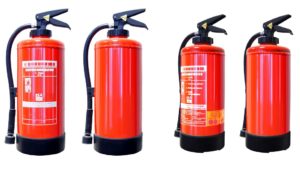As a Houston fire protection company, it comes as no shock that we believe it’s smart to keep fire extinguishers in areas that might be prone to a fire sparking up. With this being said, though, there are a few different types of extinguishers and none of them will extinguish every type of fire. So which one do you purchase depending on the most common type of fire that might break out in a particular area? Let’s explore your options:
Class A Fires
Class A fires are better known as combustible material fires. When you think of combustible materials, think of wood or paper- materials that can be flammable. Home fires are generally extinguished with help from water, but other extinguishers can also be used to calm a class A fire. Foam extinguishers, dry powder extinguishers, and even a wet chemical extinguisher will work to put out this type of fire. The one type extinguisher you should not consider for this type of fire is a CO2 extinguisher. A CO2 extinguisher may not be able to overtake enough of the oxygen that is fueling the fire to put the fire out completely.
Class B Fires
Have a fire that starts in a garage? It’ll likely be (or quickly become) a class B fire if you store any paint or petrol in your garage. A water extinguisher will not help with this type of fire, nor will a wet chemical extinguisher. We know what you’re thinking- water puts out all fire, right? Wrong! In this case, there’s a good chance that water will spread the chemicals further, thus scattering the flames. A wet chemical extinguisher is no different from a water extinguisher in this type of fire. If you’re working in a commercial vehicle repair garage, for example, consider purchasing a foam, dry powder, or CO2 extinguisher.
Class C and D Fires
Class C and D fires are all about flammable gases and metals. The proper extinguisher needs to stabilize the burning element and be made out of non-conductive chemicals to ensure that a bigger explosion doesn’t happen between two elements. For this, the only appropriate type of extinguisher would be a dry powder extinguisher. Dry powder extinguishers work to create a barrier of sorts between the oxygen that’s fueling the fire and the burning element. Any business dealing in natural gas or welding should have a dry powder extinguisher handy.
Electrical Fires
Electrical fires are probably one of the most common types of fires. Many people, despite the constant warnings, do not take care of electrical wiring the way they should. Th

is leaves a lot of room for potential fire hazards. NEVER use water, foam, or wet chemicals on this type of fire. It will only make the fire worse. Instead, opt for a dry powder or a CO2 extinguisher that will suffocate the flame and not totally ruin the electrical equipment. These types of extinguishers would be the most beneficial in a data center or an office. Remember: water + electricity is a no-no.
Deep Fat Fryers
Deep fryers are usually the cause of fast food restaurants catching fire. These types of fires are very finicky and the wrong type can easily make a grease fire worse. The only extinguishing agent that should be used for a fire like this is a wet chemical extinguisher. The chemical extinguisher works to provide a layer of foam that coats the oil or fat and prevents it from fueling any other fires. This type of extinguisher also has a cooling effect which can help the fire extinguishing process as well.
All of these various forms of fire extinguishing can get confusing and leave you not knowing which extinguisher to buy. Instead of purchasing the wrong extinguisher for your business, consult with a Houston fire protection company such as Advantage. We can evaluate your surroundings and give you the best idea of what you’ll need in case a fire breaks out.

